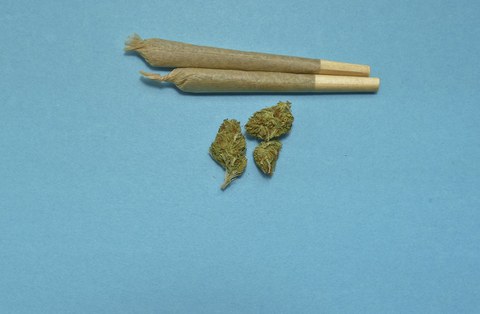Apr 01, 2023
Fact Check: Cannabis – Gateway to the Drug Abyss?

Cannabis is the most common illegal drug, consumed by more than 22 million users in the European Union. Opponents often claim it to be a gateway drug
Cannabis is the most common illicit drug in the European Union, with an estimated 22.2 million users aged 15-64 last year1. Its status as an illicit drug may soon change, however. More and more countries are discussing legalizing the recreative use of cannabis. In fact, the new German government is planning to legalize recreational use, much to the dismay of those who oppose legalizing cannabis. An argument often used against the legalization is that it is a gateway drug. Gateway drugs are drugs that lead to the use of other, harder drugs, such as cocaine. Typically the gateway sequence is said to start with alcohol and tobacco, which lead to cannabis, which in turn leads to to more damaging, addictive drugs. CSU politician Emmi Zeulner claimed that cannabis is a gateway drug in a speech on the German Narcotics Law in front of the German parliament in 20172. During the speech, Frank Tempel (Die Linke) retorted that the gateway effect of cannabis has been scientifically refuted. But what is the truth?
Unsurprisingly, considering the controversy of the subject, there are multiple studies seeking to examine the gateway effect of cannabis 3,4,5,6,7,8. Almost all of them have found a strong association between cannabis use and later use of harder drugs. However, correlation is not enough to prove causation, and many confounding factors have been identified 3,4,5,6,7,8,9. It is possible that these factors are the real cause and that the observed effect is simply due to affected people being likely to consume both cannabis and other drugs. These factors include mental illnesses, such as depression or anxiety, and several demographic factors, such as a difficult childhood. Additionally, some people may simply be genetically predisposed to drug use. However, even after adjusting for these factors, a strong association between cannabis use and later use of harder drugs could be found4, 10. Furthermore, higher doses of cannabis increased the risk of using harder drugs later in life and the age of onset of cannabis use also has an effect. People who started using cannabis at a younger age were at higher risk to using harder drugs later on. This indicates that cannabis could cause other drug use, especially in adolescents. A study on rats revealed further evidence that cannabis could potentially influence addictive behavior, but only some behaviors were affected, and similar effects are yet to be observed in humans11.
Research has shown that drug use in general, including alcohol and tobacco, correlates with later use of harder drugs, regardless of whether the gateway sequence is followed 12, 13. It seems clear that cannabis use is correlated with the use of harder drugs in later life, but the underlying causes have not been identified. Hence, it is unclear whether the gateway hypothesis is correct or whether cannabis use and use of harder drugs simply share the same causes. Identifying and preventing these causes may be more effective in preventing the use of hard drugs than focusing on one particular drug.
Issue 6
Birte Martens, Anne Ryndyk, Sophia Winkler
